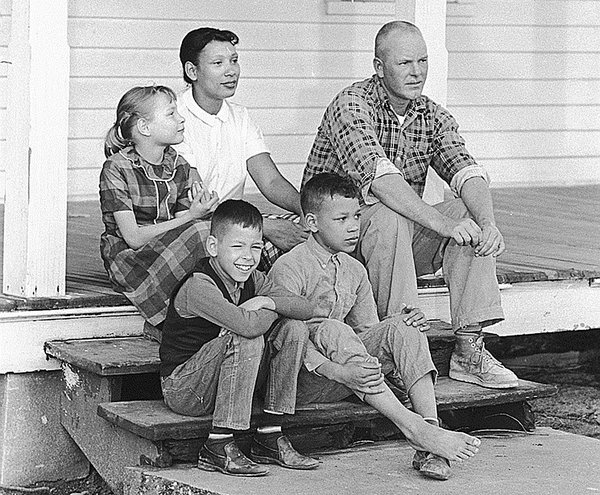
Richard and Mildred Loving at their home in Central Point, Va. with their children, Peggy (from left), Donald and Sidney, in 1967. Free Lance-Star, via Associated Press
[2023 repost of an earlier post; revised]
When the the Supreme Court made its historic ruling in two cases in 2015 related to marriage equality (“Highlights from the Supreme Court Decisions on Same-Sex Marriage,” New York Times), the decision drew upon the case of Loving v. Virginia –decided by the Supreme Court on June 12, 1967 –56 years ago.
The case involved the law in Virginia, and other states, which prohibited interracial marriage, or “miscegenation.”
Loving v. Virginia changed that. And America.
“Today, one in six newlyweds in the United States has a spouse of a different race or ethnicity, according to a recent analysis of 2015 census data by the Pew Research Center. That is a five-fold increase from 1967, when just 3 percent of marriages crossed ethnic and racial lines.” (Source: New York Times)
Richard Loving, a white man, married Mildred, a 18-year-old woman of African-American and Native American descent, in Washington, D.C. When they returned to their native Virginia, they were arrested in the middle of the night and the Lovings were forced to leave Virginia. A few years later, young Mildred asked Robert F. Kennedy, the new Attorney General, for help. He suggested the American Civil Liberties Union and she wrote to them. Two young lawyers decided to take the case. They brought suit which eventually found its way to the Supreme Court
The Court ruled that anti-miscegenation laws, such as those in Virginia, violated the Due Process Clause (“No person shall be … deprived of life, liberty, or property, without due process of law….” ) and the Equal Protection Clause of the Fourteenth Amendment (“nor shall any State deprive any person of life, liberty, or property, without due process of law …”).
In the unanimous majority opinion, Chief Justice Earl Warren wrote:
“Marriage is one of the ‘basic civil rights of man,’ fundamental to our very existence and survival.”
Change in American history is often slow. And it usually comes from the bottom up –not the top down. Whether it was abolition, civil rights, or even independence itself, when it comes to most of the great social upheavals of our past, the politicians and “leaders” have generally had to be dragged kicking and screaming in the direction of change. It may be glacially slow, but it will happen, in part because there is a generational change that made same sex marriage prohibitions on the books seem as antiquated –and as wrong —as the now-unconstitutional bans on interracial marriage.
Before her death in 2008, Mildred Loving, the young woman who brought the suit against Virginia, issued a statement on the 40th anniversary of the decision. She wrote:
“Surrounded as I am now by wonderful children and grandchildren, not a day goes by that I don’t think of Richard and our love, our right to marry, and how much it meant to me to have that freedom to marry the person precious to me, even if others thought he was the ‘wrong kind of person’ for me to marry. I believe all Americans, no matter their race, no matter their sex, no matter their sexual orientation, should have that same freedom to marry. Government has no business imposing some people’s religious beliefs over others. I am still not a political person, but I am proud that Richard’s and my name is on a court case that can help reinforce the love, the commitment, the fairness, and the family that so many people, black or white, young or old, gay or straight seek in life. I support the freedom to marry for all. That’s what Loving, and loving, are all about.”
Text of statement: “Mildred Loving, 40 Years Later,” Atlantic
The January/February 2012 issue of Humanities magazine featured the Lovings.
There is a more complete discussion of the history of the Lovings, their case and its connection to the same sex marriage debate in the new, revised edition of Don’t Know Much About History: Anniversary Edition.